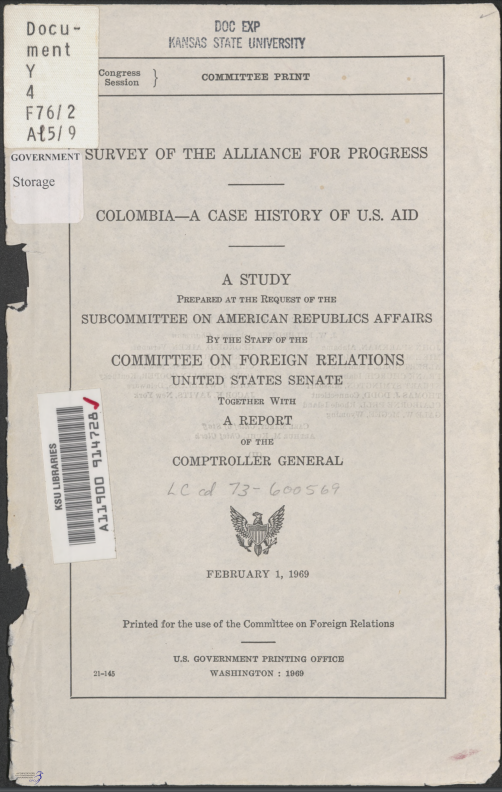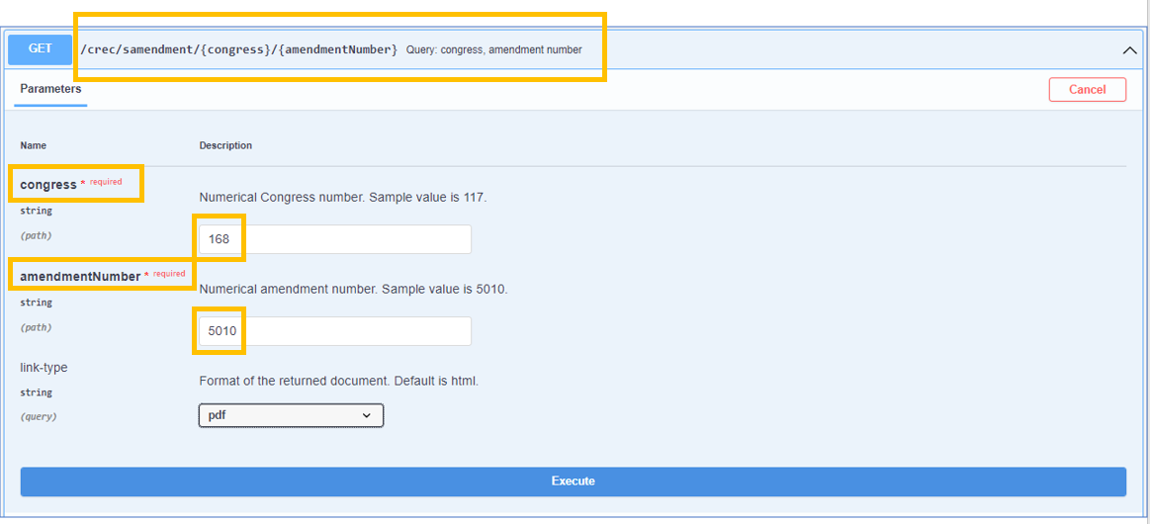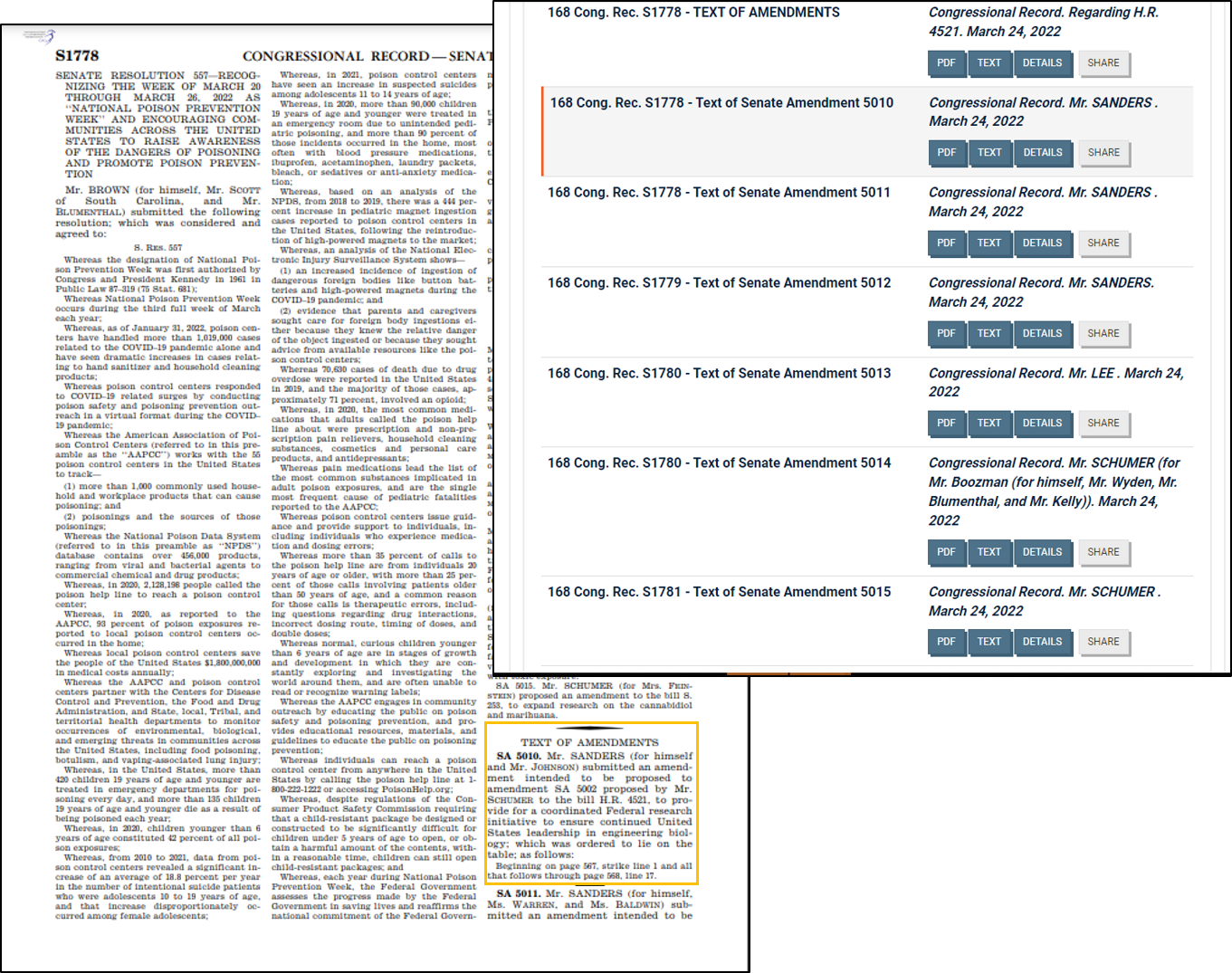Published: July 12, 2022
This deployment featured a variety of new features, functionality, and improvements including 83 individually tracked changes. This article covers some of the highlights such as support for providing access to digitized Committee Prints, updates to the Congressional Record for retrieving Senate amendments including Link Service functionality, improvements to handling Hearing Addenda, enhanced deep paging for the public API, a major version upgrade to the public-facing content management system (CMS), refactoring of several public components, and much more.
New Content: Over 38,000 content packages (roughly equivalent to one bound printed document) were made available since the last deployment. Notable submissions since the last release included the Economic Report of the President (2022)H. Doc 116-177U.S. Bankruptcy Court Southern District of Ohio (OHSB) U.S. Court of Federal Claims (COFC)Privacy Act Issuances collection; S. Doc 117-8 - Secretary Report of the Senate for Part I and Part II, additional digitized Serial Set volumes, digitized Congressional hearings, digitized Committee prints, additional Railroad Retirement Board publications, and GPO partnership publications.
Feature Articles: Eight articles were published since the end of March. These included articles commemorating National Park Week, Earth Day 2022, Armed Forces Day, Memorial Day, Flag Day, the Juneteenth celebration of freedom, Independence Day, and an article featuring the latest Economic Report of the President.

Digitized Congressional Committee Prints: GPO continues to focus on various strategic digitization initiatives that include digitizing historical publications and making them available on GovInfo. In this release, the team worked on development to prepare for processing, publishing, and publicly displaying of digitized prints in the Congressional Committee Prints collection. Additional historical, digitized prints will be published in GovInfo over the coming months, and even more will be added over time. Committee prints are publications issued by Congressional committees that include topics related to their legislative or research activities, as well as other matters, such as, memorial tributes. Subjects of committee prints vary greatly, but some typical categories are draft reports and bills, directories, statistical materials, investigative reports, historical reports, situational studies, confidential staff reports, hearings, and legislative analyses. Visit Help to learn more about the Congressional Committee Prints collection.
To the right is the cover page of a digitized Congressional committee print.
Link Service Functionality for Text of Senate Amendments in the Congressional Record: Earlier this year, GPO made improvements to the Congressional Record to increase access to the text of submitted and proposed Senate amendments by creating smaller sub-granules for the amendments. In this release, the GovInfo Link Service functionality for these sub-granules was created to enable users and developers to utilize query-and-parameter-based links for content and metadata, specifically to retrieve Congressional Record sub-granules that match a specific Congress and Senate Amendment number. GPO’s GovInfo Link Service is built and documented using the Open API Spec and Swagger UI .
An example of one of the smaller sub-granules for the original top-level granule is 168 Cong. Rec. S1778 - Text of Senate Amendment 5010. Using this Link Service pattern: link/crec/samendment/{{congress}}/{{amendmentNumber}} the link for the Amendment 5010 example will be https://www.govinfo.gov/link/crec/samendment/117/5010?link-type=pdf.
The figure below depicts the new section of the Link Service documentation for the amendment text functionality.

The image below displays the sub-granule and page from the Congressional Record that will then be retrieved after indicating the request for the PDF rendition within the Link Service parameter.

Currently, the Congressional Record issues back to the first day of the 117th Congress have the new sub-granules created from this development.
Improvements are regularly being evaluated and incorporated into releases for the Link Service and public API to support the developer community. We encourage users to share suggestions for new endpoints or changes on GitHub .
Support for Addenda to Congressional Hearings: As part of an effort to bring greater consistency to the publishing process for documents within the Congressional Hearings collection, GPO improved how hearing addenda are handled. This also includes errata that are issued for hearing addenda (i.e., corrected text versions) and other ancillary documents that are published for the purpose of being part of the hearing report. Addenda can include miscellaneous publications that are referenced during a hearing and requested to be made available along with the hearing report by the issuing committee(s). Hearing addenda now have associated “access IDs” which enables GPO to more effectively present and associate addenda with their corresponding hearing reports.
For example, access IDs would look like this:
- CHRG-116hhrg36909-add1
- CHRG-116hhrg36909-add2
- CHRG-116hhrg36909-add3
- CHRG-116hhrg36909-add4
- CHRG-116hhrg36909-add5
API Pagination to Return more than 10,000 Results: In an effort to support users and data partners who consume content via the API, GPO has made it possible to retrieve more than 10,000 paginated results from the API. This required a small change to the initial request to use an offsetMark parameter instead of offset. This functionality was a highly requested feature from users wishing to access large sets of data from the API. Here is an example request:
This request will allow users to use scripts to retrieve all 283,000 appellate court results from the United States Courts (USCOURTS) collection.
The existing offset parameter will continue to work until December of 2022. For more information and further updates, follow the associated GitHub issue .
Major Version Upgrade for Public CMS: The public user interface for GovInfo uses a web content management system (CMS) to facilitate flexibility in presentation of web pages and content. Due to the need to keep up-to-date with functionality and to support other benefits, the team undertook a major version upgrade for the public CMS and deployed the new version this release. Also, as part of continual prioritization of growth to maintain optimal performance, the team continued work to refactor and update code for public facing web components.
Additional Enhancements:
- Improved detection of House reports in Public and Private Law legislative history fields.
- Updated the API to include Public and Private Law related endpoints.
- Updated the API to include jacketId, number, and docClass fields in granules summaries.
- Updated the XML Metadata Editor for the Serial Set to make key elements trigger a reprocess.
- Changed the XML Metadata Editor so that changes to key elements for the Public Papers of the Presidents collection triggered a reprocess.
- Updated the XML Metadata Editor for the Congressional Hearings collection to allow the addition of the congCommittee/authorityId element for parsed House Armed Services Committee (HASC) hearing reports.
- Enhanced the XML Metadata Editor for various metadata elements in the Congressional Record collection.
- Modified the XML Metadata Editor to persist changes to values in the Congressional Bills shortTitle element.
- Updated the XML Metadata Editor to support granule order in the submission workspace.
- Changed the XML Metadata Editor for the Public Papers of the Presidents collection to support “Read Only” Elements.
- Updated the XML Metadata Editor to provide editors with access to Help information.
- Fixed an issue with the General Publications (GOVPUB) collection to make PDFs display correctly on granule Details pages under Download.
- Updated the Publisher component to better handle updates to Bulk Data ZIP files.
- Updated how the Bill Status and eCFR collections are processed and made available as Bulk Data.
- Updated the API documentation page so it properly passes keys for requests.
- Updated bulk loading functionality for the internal content management system.
- Added thread-level logging for the Publisher component.
- Created a new Publication Linking relationship in the internal business intelligence layer between Congressional Bills and Bills Status data.
- Updated the Retrieve by Citation functionality to ensure proper sorting for Federal Register volumes.
- Changed parsing rules for the Congressional Record collection to refine the sponsors that included congMember/name[@type='parsed'].
- Improved detection of SMDOC document class in the Serial Set collection.
- Updated Search Results formatting for more efficient content layout and better readability.
- Created new baseline integration testing for the API to support improved continuous integration and delivery efforts.
- Updated the Congressional Hearings collection parser to handle hearing addenda.
- Improved visual display of menus on curated pages such as the Help and About pages.
- Updated header search widget display on the Serial Set Topic Browse page to match other pages and fixed an issue with the mobile menu views.
- Removed extra USLM and XSLX renditions that were being incorporated into RSS feeds for several collections.
- Upgraded numerous internal components’ schemas and parsers.
- Implemented important and routine component upgrades, license and software updates, and security enhancements.
About Release Notes -- Changes to GovInfo components are made through code deployments on a quarterly release cycle. Release Notes are published after deployments to highlight some of the key changes, summarize other noteworthy activities, and recap new content, feature articles, and top searches since the previous release Read previous editions of Release Notes.